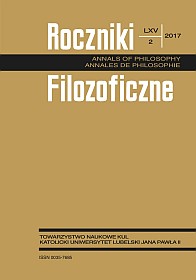The Best of All Possible Worlds and the Christian Thesis of the Corruption of the World
Abstrakt
Świat najlepszy z możliwych a chrześcijańska teza o skażeniu świata
Twierdzenie Leibniza, że świat, w którym żyjemy, jest najlepszym z możliwych, pozostaje w sprzeczności z naszym doświadczeniem i dlatego utrzymujemy, że ten świat stałby się lepszy, gdyby przynajmniej niektóre z jego cech i właściwości były inne. Leibniz protestował przeciwko takiemu stanowisku i argumentował, że każda zmiana tego świata uczyniłaby go gorszym albo wręcz niemożliwym. To jednak zdaje się przeczyć chrześcijańskiemu przekonaniu, że nasz świat jest skażony grzechem, ale u kresu czasu zostanie odnowiony, stając się rzeczywistością zbawienia, czyli najdoskonalszą z możliwych. W artykule uzasadnia się dwie tezy: (1) twierdzenie Leibniza nie pozostaje w sprzeczności z chrześcijańską tezą o zbawieniu, (2) twierdzenie Leibniza jest sprzeczne z ludzkim doświadczeniem świata, ponieważ jest rezultatem intelektualnej spekulacji opartej na fałszywym założeniu o adekwatności struktury umysłu ludzkiego względem umysłu Boga.
Bibliografia
The Anathemas Against Origen. Canon XI. Christian Classics Ethereal Library. NPNF2-14. The Seven Ecumenical Councils, accessed 11.10.2016, http://www.ccel.org/ccel/schaff/npnf214.xii.ix.html.
Augustine. The City of God. Translasted by Marcus Dods. New Advent, accessed 11.10.2016. http://www.newadvent.org/fathers/120120.htm.
Couturat, Louis. Opuscules et fragments inédits de Leibniz. Paris: Alcan, 1903.
Cyril of Jerusalem. Catechetical Lecture 15, 3, http://www.newadvent.org/fathers/310115.htm.
Descartes, René. Philosophical Writings, edited and translated by Norman Kemp Smith. New York: The Modern Library, 1958.
Die Philosophischen Schriften von G. W. Leibniz. Vol. VII, edited by Carl Immanuel Gerhardt. Berlin: Weidmann, 1890.
Gilson, Étienne. God and philosophy. London: Yale University Press, 1941.
Grover, Stephen. “West Or Best? Sufficient Reason in the Leibniz-Clarke Correspondence.” Studia Leibnitiana 28 (1996), 1: 84–92.
The Holy Bible. New International Version. Containing The Old Testament and The New Testament, New York: American Bible Society 1978.
Hume, David. Dialogues concerning Natural Religion. London: s.e., 1779.
Leibnitz, Gottfried Wilhelm. La Monadologie, edited by Émile Boutroux. Paris: Delagrave, 1880.
Leibniz, Gottfried Wilhelm. Philosophical Essays, edited and translated by Roger Ariew and Daniel Garber. Indianopolis & Cambridge: Hackett Publishing Company, 1989.
Leibniz, Gottfried Wilhelm. Philosophical Texts. Translated and edited by R.S. Woolhouse and Richard Francks. Oxford: Oxford University Press 1998.
Leibniz, Gottfried Wilhelm. The Leibniz–Clarke Correspondence, edited by Hubert G. Alexander. Manchester: Manchester University Press, 1956.
Leibniz, Gottfried Wilhelm. Theodicy: Essays on the Goodness of God, the Freedom of Man, and the Origin of Evil. Translated by Eveleen M. Huggard, Chicago: Open Court 1985.
Mercer, Christia. “Leibniz on Mathematics, Methodology and the Good: A Reconsideration of the Place of Mathematics in Leibniz’s Philosophy.” Early Science and Medicine 11 (2006), 4: 424–454.
Perkins, Franklin. Leibniz: A Guide for Perplexed. London, New York: Continuum International Publishing Group, 2007.
Copyright (c) 2017 Roczniki Filozoficzne

Utwór dostępny jest na licencji Creative Commons Uznanie autorstwa – Użycie niekomercyjne – Bez utworów zależnych 4.0 Międzynarodowe.





